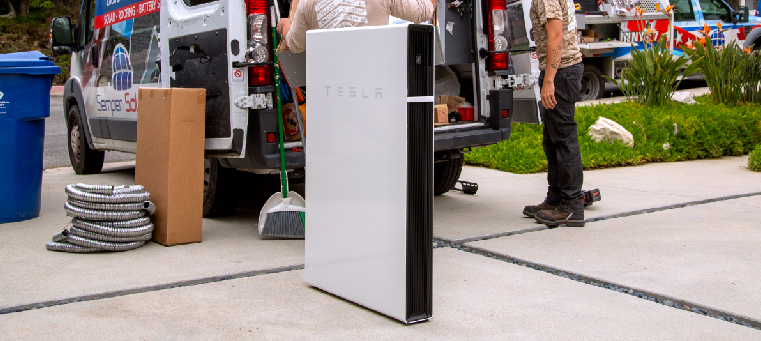




Several years ago, Elon Musk steered Tesla Motors into the renewable energy market with an innovative home energy storage product – Tesla Powerwall. This home battery is designed with the same dedication to detail and innovation as Tesla’s cutting-edge electric vehicles and other ventures. While Tesla certainly didn’t invent solar storage batteries, they certainly used their reputation as a leading-edge tech and renewable energy-conscious company to launch their Powerwall into a mostly untapped market. With Tesla’s stamp of approval, new buzz and interest have surrounded the prospect of storing solar energy created by a home’s solar panels.
So what exactly is the Powerwall? According to Tesla, it is a small-scale rechargeable lithium ion battery that provides homeowners with more access to self-sustaining energy for their homes
These batteries are designed for optimal use with a solar panel system. How does having the Powerwall installed change the game for homeowners with solar panels? It gives them much more independence from the grid when it comes to energy needs during low production times. Essentially, the Powerwall allows a homeowner to fully control their electricity production and usage by storing home energy for later use.
As would be expected, Tesla spent a significant amount of time and energy developing the Powerwall into a reliable, effective home battery for regular use. The battery works by storing any excess electricity your solar panels produce vs. allowing that electricity to be sent back to the grid (usually for a credit in most states). Even in states with a credit, homeowners are still technically “buying” electricity from the grid when their panels don’t produce electricity at certain times. The battery allows any surplus to be stored and used during these times rather than grid dependency.
While a single Powerwall battery won’t enable you to go completely “off the grid,” it does allow you much more freedom and starts to transition your home towards being much more self-sufficient.
Tesla backs it Powerwall up with a completely unlimited 10-year warranty. This warranty covers daily charging and usage, so essentially as much wear and tear as possible. The warranty also guarantees that a home’s Powerwall will maintain a minimum of 70% of its full charge capacity over this time. It is typical for batteries to lose some of their ability to maintain a charge with usage.
Adding a solar battery to a home solar panel system isn’t right for everyone. Further, solar batteries are still pretty new to the market, meaning the technology will continue to improve with time. If you have a utility system that provides net metering for solar panel owners, a solar battery may not be as necessary. In comparison, homeowners in areas that enforce time-of-use rates for electricity would be wise to consider investing in a solar battery to curb their expenses.
Finding out if a solar battery is a good investment for your home starts with talking to a solar expert. Semper Solaris is a Tesla Powerwall certified installer and can answer any questions you have about Tesla Powerwall or similar solar energy batteries.